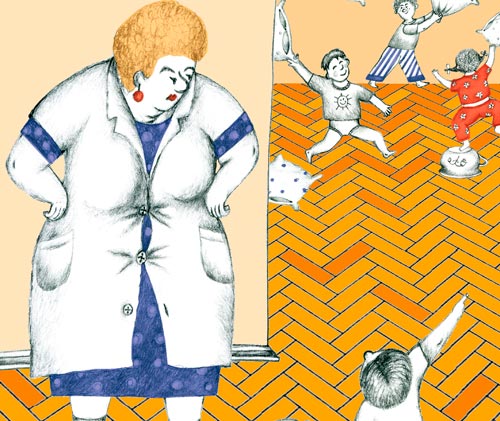"To go nuts is very bad!" - Adults respond to numerous children's complaints, often not fully listening to the child or interrupting him at a glance. Or maybe the kid just wants to talk about what happened, so that the mother or the teacher made a wise decision: they punished the culprit, resolved the conflict, or explained why other people did wrong. Hasty labeling of “sneak” will lead to the fact that children will cease to share their experiences at all. How should one react to apple-eating and where does the line between the “denunciation” and the desire to restore justice go?

Not gluttony, but ...
- Little age. If the child is not five years old, then it’s too early to talk about gluttony. The kid simply informs significant adults about what is happening around. Due to the specificity of thinking, he can evaluate the actions of other people, looking only at the reaction of his parents. “Misha is cycling again, and now it's my turn!” - the child is trying to convey two thoughts to you at once with a similar phrase: to talk about bad behavior and to clarify whether Misha actually acted badly.
- Waiting for help. Another boy took a shovel from your son, but he cannot (or is embarrassed) to ask his toy back and is forced to sit without it. In this case, telling that “Lenya does not let me play in the sand”, the baby does not oversaw, but draws your attention to his problems and asks for help.
- Sense of justice. For children with a heightened sense of justice, rules are very important. They themselves obey them implicitly, and want others to do the same. In the kindergarten, such a child is sure to come up in a teacher and tell: “Katya and Lena picked flowers on a flower bed, although you forbade them to be torn.” True, at first he himself will require the girls to behave according to the rules.
The reasons for the "true" parsnip
Starting from the age of five, children can sneak up consciously, with a very definite purpose: to cause unpleasant consequences for another person. What are the reasons for such a denunciation?

- Perhaps the child believes that such “cooperation” with adults will help him become a leader in the team. He thinks that the parents or caregiver to whom he will bring important information will reckon with his opinion.
- Often children become sneaky and report to peers or brothers out of a sense of revenge or resentment. In a similar situation, it is already possible to manipulate the parents with the help of false denunciations, so that the other child is punished.
- An increase in childish vagaries can provoke jealousy or envy. This often happens in families where parents give much more attention to one offspring than to others.An unloved child is trying to discredit a favorite in the eyes of mom or dad.
- Children with low self-esteem often think that they are worse than others. Indeed, because of this, they believe that adults pay too little attention to them. Through apple-eating, the child wants to show parents or the teacher: “Look, I’m better than others, because I help you clean up, and the rest just indulge.”
How to re-educate a little sneak?
 If other children decide that your child is a sneak, this can lead to the loss of friends or to difficulties in establishing relationships with peers. Who wants to be friends with the person who tells adults about any of their actions? Also, classmates can come up with a nasty nickname for a child, for example, a spy, informer or informer. Agree that such nicknames will hurt children's feelings and tarnish a teenage reputation.
If other children decide that your child is a sneak, this can lead to the loss of friends or to difficulties in establishing relationships with peers. Who wants to be friends with the person who tells adults about any of their actions? Also, classmates can come up with a nasty nickname for a child, for example, a spy, informer or informer. Agree that such nicknames will hurt children's feelings and tarnish a teenage reputation.
What to do to alarmed parents who are afraid that their child grows up a malicious sneak?
- Explain the difference between gluttony and important message
Be sure to tell the child what misconduct and violation of the rules should be told to adults - for example, their own safety or the safety of other children. If the child saw that the boys from the group were trying to climb over the fence of the kindergarten, or heard that the girls in the yard decided to go to the river without an escort, he must inform the adults about this. Minor misconduct (for example, the baby heard that another child swore in the heat of a quarrel) is not required to attract his attention.
- Play different scenarios
Role-playing games can be an excellent educational tool to help your child understand what oviposition is and how to behave in various situations. Ask your child a few questions on the topic: “What would you do if you would happen? ..” The situations may be as follows: another kid hit a dog, a friend ran away without demand to the city center, his brother walked dirty shoes on the parquet, etc. In the game, you can make sure that the child understands when it is appropriate to seek help from an adult, and when you can do it yourself.
- Learn the motives of little sneak
What is behind children's complaints? Perhaps the child is driven by revenge or the desire to get attention. Or maybe he's just trying to restore justice. Do a little investigation and find out the true motives of your sneak. If negative emotions (resentment or envy) are at the root of the problem, teach children healthy ways to deal with unpleasant feelings.
- Teach self-solving skills
If a child complains about other children because he cannot cope with the situation on his own, teach the necessary social skills as an alternative to gluttony. For example, if his friend “cheated” with the line and stood in the library in front of him, explain how he can tell a friend with the help of words that he was wrong.
- Provide your child with attention
Very often, positive attention can significantly reduce the number of complaints and denunciations. Take a few minutes a day to play with your baby. Let him take the initiative: builds a tower of cubes, plays with dolls, runs in the yard and does what he wants. Just ten minutes of your undivided attention reinforces good behavior and reduces the likelihood of such a way of attracting self-interest as gluttony.
- Tell us about the consequences.
An adult child can already tell in private why they do not like scammers and in which case such frankness can harm other people. Ask your child how he would feel if another person (with or without intent) spoke about his misconduct or secret. Will he feel good or bad? What will he feel: sadness, shame, disappointment?
Children will need a lot of experience and time to see the line between gnawing and a fair report of an inappropriate act.It is good if your child can at any time explain to you what exactly he is worried about in the behavior of peers and adults, and you will tell you what to do in a given ambiguous situation.
READ ALSO:









Indeed, in the issue of “shedding” it is important to determine the line when it is worth telling adults and when it is better to remain silent. We, in adulthood, face such a problem. My daughter is 6 years old, and while she talks about her adventures in detail, I try to teach her how to cope herself, without resorting to complaints